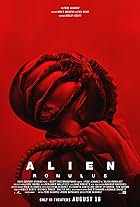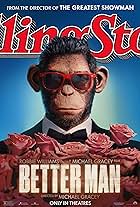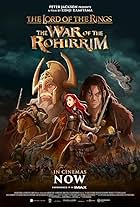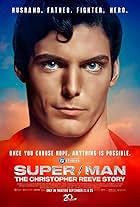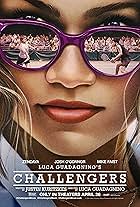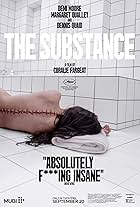
MaxBorg89
Joined Apr 2005
Welcome to the new profile
We're still working on updating some profile features. To see the badges, ratings breakdowns, and polls for this profile, please go to the previous version.
Ratings38.8K
MaxBorg89's rating
Reviews958
MaxBorg89's rating
How do you possibly live up to The Dark Knight? A question that has been asked by many people, not least Christopher Nolan, the man trusted with the unenviable task of following the aforementioned blockbuster with a suitable conclusion for his take on the Batman mythos. A job made even trickier by the fact that, unlike Spider-Man 3 (which was meant to have a follow-up) or X-Men: The Last Stand (which might still get one), The Dark Knight Rises has been described by all the people involved in its making as the final chapter, the definitive end point for Nolan's Bat-saga. So the question remains: how do you live up to The Dark Knight? Answer: you don't. But you still deliver an intelligent, riveting piece of filmmaking that proves to be a worthy epilogue.
When we last saw Batman (Christian Bale), he had vanished into the shadows, taking the fall for the death and crimes of Harvey Dent (Aaron Eckhart, briefly featured in archive footage). Eight years have passed since that night, and the Caped Crusader has disappeared from Gotham City. Bruce Wayne has similarly withdrawn from public life, convinced there is nothing left that is worth living for, much to the chagrin of Alfred (Michael Caine). That is, until something happens that changes Bruce's dual life: the arrival of Bane (Tom Hardy), a terrorist bent on the destruction of Gotham, who is capable of breaking Batman both physically and spiritually. With a little help from his old allies (Gary Oldman's Jim Gordon, Morgan Freeman's Lucius Fox) and some new faces (Joseph Gordon-Levitt as police officer John Blake and Anne Hathaway as "cat burglar" Selina Kyle), the Dark Knight has to return to save his city from annihilation. But what price will he have to pay?
The defining characteristic of Nolan's Bat-films has always been the grounded, reality-based look at the different tropes of the superhero genre, and this chapter shows the director at his most ambitious, throwing in overt references to financial crisis and the US government's attitude towards terrorists (complete with a brief scene featuring the President which, thankfully, doesn't slip into Roland Emmerich territory). These themes are perfectly encapsulated in the figure of Bane, an intriguing villain who, despite never reaching the heights of Heath Ledger's Joker, remains a frightening presence and acts as the main connecting tissue to ideas first touched upon in Batman Begins, which provides the jumping point for many of The Dark Knight Rise's most poignant scenes.
That said, Nolan's ambition is also the film's biggest flaw: even at an impressive 164 minutes, the film feels too short to squeeze in everything he has to say as he tries to bring the trilogy full circle (cue Liam Neeson and Cillian Murphy cameos). This is most obvious in the third act, a rushed, action-packed affair that also suffers from unexpectedly contrived plotting. A given in any other superhero film, it comes as a surprise that Nolan, famous for bending or even breaking narrative conventions (he killed off the hero's love interest halfway through the second movie, for crying out loud), should in this case resort to a more predictable climax, effectively embracing the comic-book roots that the trilogy had, thus far, left in a corner. This also accounts for a couple of fan-baiting twists that may prove amusing to some, irritating to others.
Nevertheless, the film's heart is in the right place: after the Joker-centric mayhem of The Dark Knight, the focus in this installment is once again on Bruce Wayne, whose personal journey has been the trilogy's emotional anchor. Bale, who's always been perfect in the role, goes even further this time around with his portrayal of a broken man, touchingly aided by similarly compelling performances by Caine and Oldman. And it's testament to Nolan's skill that, even though some of the new characters inevitably get more attention (Hardy gives Bane the on-screen dignity he was shamefully denied in Batman & Robin, while Hathaway's introductory scene alone would justify a spin-off for her Selina), none of the supporting roles feel like afterthoughts, even when it looks like actors of the caliber of Marion Cotillard and Matthew Modine come off as shortchanged in terms of presence.
Darker and more brutal than its predecessors, The Dark Knight Rises still offers a glimmer of hope, and is therefore a fitting epilogue for what is, at this point, the best superhero series put to film. And while the conclusion doesn't exactly live up to what can only be described as sky-high expectations, one should not overlook the fact that this has the guts to actually be THE end. And given the circumstances, it's exactly what we need, and what we deserve.
When we last saw Batman (Christian Bale), he had vanished into the shadows, taking the fall for the death and crimes of Harvey Dent (Aaron Eckhart, briefly featured in archive footage). Eight years have passed since that night, and the Caped Crusader has disappeared from Gotham City. Bruce Wayne has similarly withdrawn from public life, convinced there is nothing left that is worth living for, much to the chagrin of Alfred (Michael Caine). That is, until something happens that changes Bruce's dual life: the arrival of Bane (Tom Hardy), a terrorist bent on the destruction of Gotham, who is capable of breaking Batman both physically and spiritually. With a little help from his old allies (Gary Oldman's Jim Gordon, Morgan Freeman's Lucius Fox) and some new faces (Joseph Gordon-Levitt as police officer John Blake and Anne Hathaway as "cat burglar" Selina Kyle), the Dark Knight has to return to save his city from annihilation. But what price will he have to pay?
The defining characteristic of Nolan's Bat-films has always been the grounded, reality-based look at the different tropes of the superhero genre, and this chapter shows the director at his most ambitious, throwing in overt references to financial crisis and the US government's attitude towards terrorists (complete with a brief scene featuring the President which, thankfully, doesn't slip into Roland Emmerich territory). These themes are perfectly encapsulated in the figure of Bane, an intriguing villain who, despite never reaching the heights of Heath Ledger's Joker, remains a frightening presence and acts as the main connecting tissue to ideas first touched upon in Batman Begins, which provides the jumping point for many of The Dark Knight Rise's most poignant scenes.
That said, Nolan's ambition is also the film's biggest flaw: even at an impressive 164 minutes, the film feels too short to squeeze in everything he has to say as he tries to bring the trilogy full circle (cue Liam Neeson and Cillian Murphy cameos). This is most obvious in the third act, a rushed, action-packed affair that also suffers from unexpectedly contrived plotting. A given in any other superhero film, it comes as a surprise that Nolan, famous for bending or even breaking narrative conventions (he killed off the hero's love interest halfway through the second movie, for crying out loud), should in this case resort to a more predictable climax, effectively embracing the comic-book roots that the trilogy had, thus far, left in a corner. This also accounts for a couple of fan-baiting twists that may prove amusing to some, irritating to others.
Nevertheless, the film's heart is in the right place: after the Joker-centric mayhem of The Dark Knight, the focus in this installment is once again on Bruce Wayne, whose personal journey has been the trilogy's emotional anchor. Bale, who's always been perfect in the role, goes even further this time around with his portrayal of a broken man, touchingly aided by similarly compelling performances by Caine and Oldman. And it's testament to Nolan's skill that, even though some of the new characters inevitably get more attention (Hardy gives Bane the on-screen dignity he was shamefully denied in Batman & Robin, while Hathaway's introductory scene alone would justify a spin-off for her Selina), none of the supporting roles feel like afterthoughts, even when it looks like actors of the caliber of Marion Cotillard and Matthew Modine come off as shortchanged in terms of presence.
Darker and more brutal than its predecessors, The Dark Knight Rises still offers a glimmer of hope, and is therefore a fitting epilogue for what is, at this point, the best superhero series put to film. And while the conclusion doesn't exactly live up to what can only be described as sky-high expectations, one should not overlook the fact that this has the guts to actually be THE end. And given the circumstances, it's exactly what we need, and what we deserve.
Given his entire filmography is concerned with themes linked to man's identity and the complexities of human sexuality, David Cronenberg is, on paper at least, the ideal director for A Dangerous Method, a movie dealing with the birth of psychoanalysis. Then again, the film is also a bit of an odd fit for him, since the script by Christopher Hampton (Dangerous Liaisons) doesn't really lend itself to the outbursts of graphic violence that permeate the Canadian auteur's body of work. The result, first witnessed at the Venice Film Festival (after the film had allegedly been rejected by Cronenberg's fest of choice, Cannes), is an interesting but somewhat hollow entry in the director's admirable career.
Ostensibly about the professional relationship between Sigmund Freud (Viggo Mortensen) and Carl Jung (Michael Fassbender), A Dangerous Method is in reality more concerned with the bond between Jung and Sabina Spielrein (Keira Knightley), a young woman sent to his clinic in Zurich since her mental condition is an ideal subject for his research. Sabina, it turns out, is incredibly well-read, and soon progresses from patient to assistant, much to the amusement of Freud, who corresponds regularly with Jung about their mutual scientific interests and also meets the young woman on a few occasions. The relationship between the three evolves in even stranger ways as time passes, with Sabina taking an unexpected place in Jung's heart...
With its combination of psychoanalysis and sex, the story - perhaps familiar to European film buffs thanks to Roberto Faenza's Italian-language take on the same subject - has all the right characteristics to be vintage Cronenberg (hints of which are offered in the opening and closing credits via Howard Shore's music). And yet there's something missing: whereas the reconstruction of Vienna in the early 20th century is impeccable, the director appears to be less interested in the actual development of story and character, with a rather detached approach that suggests he's almost working on autopilot. That having said, part of the blame can be laid on Hampton, whose screenplay only glosses over key details of the story, leaving us with a quite simplified, "safe" version of events (the sex is unusually tame and unchallenging for a Cronenberg film).
The performances are a mixed bag as well: Knightley, stuck with the showy role, is unbearably OTT in the first 30 minutes, shouting and shaking endlessly before she eventually tones down the mania and focuses on finding the character, complete with a solid Russian accent. At the other end of the spectrum is Mortensen, pitch-perfect from the start but criminally underused, especially considering his past associations with Cronenberg. And then there's Fassbender, quietly intense and generally up to the task, were it not for his decision to speak RP English when he and Mortensen, who adopts a German accent, are supposed to be from the same country (this is even more perplexing if one thinks of Fassbender's flawless mastery of German).
A Dangerous Method is thus a textbook case of a film that, while not disappointing in the strict sense of the word, comes off as a minor effort in a generally spotless filmography. But even on an off-day, Cronenberg deserves to be seen at least once. Just don't expect another History of Violence...
6,5/10
Ostensibly about the professional relationship between Sigmund Freud (Viggo Mortensen) and Carl Jung (Michael Fassbender), A Dangerous Method is in reality more concerned with the bond between Jung and Sabina Spielrein (Keira Knightley), a young woman sent to his clinic in Zurich since her mental condition is an ideal subject for his research. Sabina, it turns out, is incredibly well-read, and soon progresses from patient to assistant, much to the amusement of Freud, who corresponds regularly with Jung about their mutual scientific interests and also meets the young woman on a few occasions. The relationship between the three evolves in even stranger ways as time passes, with Sabina taking an unexpected place in Jung's heart...
With its combination of psychoanalysis and sex, the story - perhaps familiar to European film buffs thanks to Roberto Faenza's Italian-language take on the same subject - has all the right characteristics to be vintage Cronenberg (hints of which are offered in the opening and closing credits via Howard Shore's music). And yet there's something missing: whereas the reconstruction of Vienna in the early 20th century is impeccable, the director appears to be less interested in the actual development of story and character, with a rather detached approach that suggests he's almost working on autopilot. That having said, part of the blame can be laid on Hampton, whose screenplay only glosses over key details of the story, leaving us with a quite simplified, "safe" version of events (the sex is unusually tame and unchallenging for a Cronenberg film).
The performances are a mixed bag as well: Knightley, stuck with the showy role, is unbearably OTT in the first 30 minutes, shouting and shaking endlessly before she eventually tones down the mania and focuses on finding the character, complete with a solid Russian accent. At the other end of the spectrum is Mortensen, pitch-perfect from the start but criminally underused, especially considering his past associations with Cronenberg. And then there's Fassbender, quietly intense and generally up to the task, were it not for his decision to speak RP English when he and Mortensen, who adopts a German accent, are supposed to be from the same country (this is even more perplexing if one thinks of Fassbender's flawless mastery of German).
A Dangerous Method is thus a textbook case of a film that, while not disappointing in the strict sense of the word, comes off as a minor effort in a generally spotless filmography. But even on an off-day, Cronenberg deserves to be seen at least once. Just don't expect another History of Violence...
6,5/10



